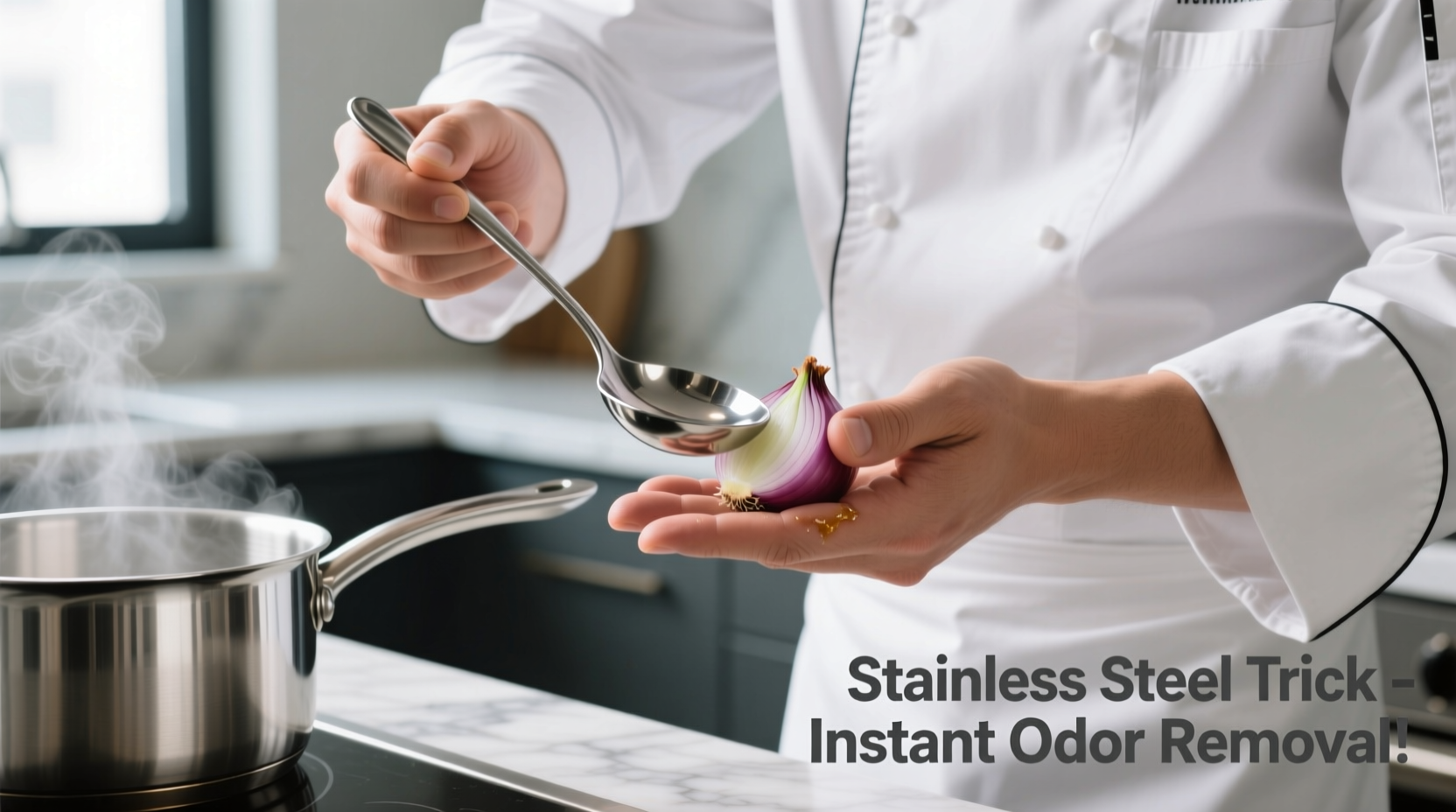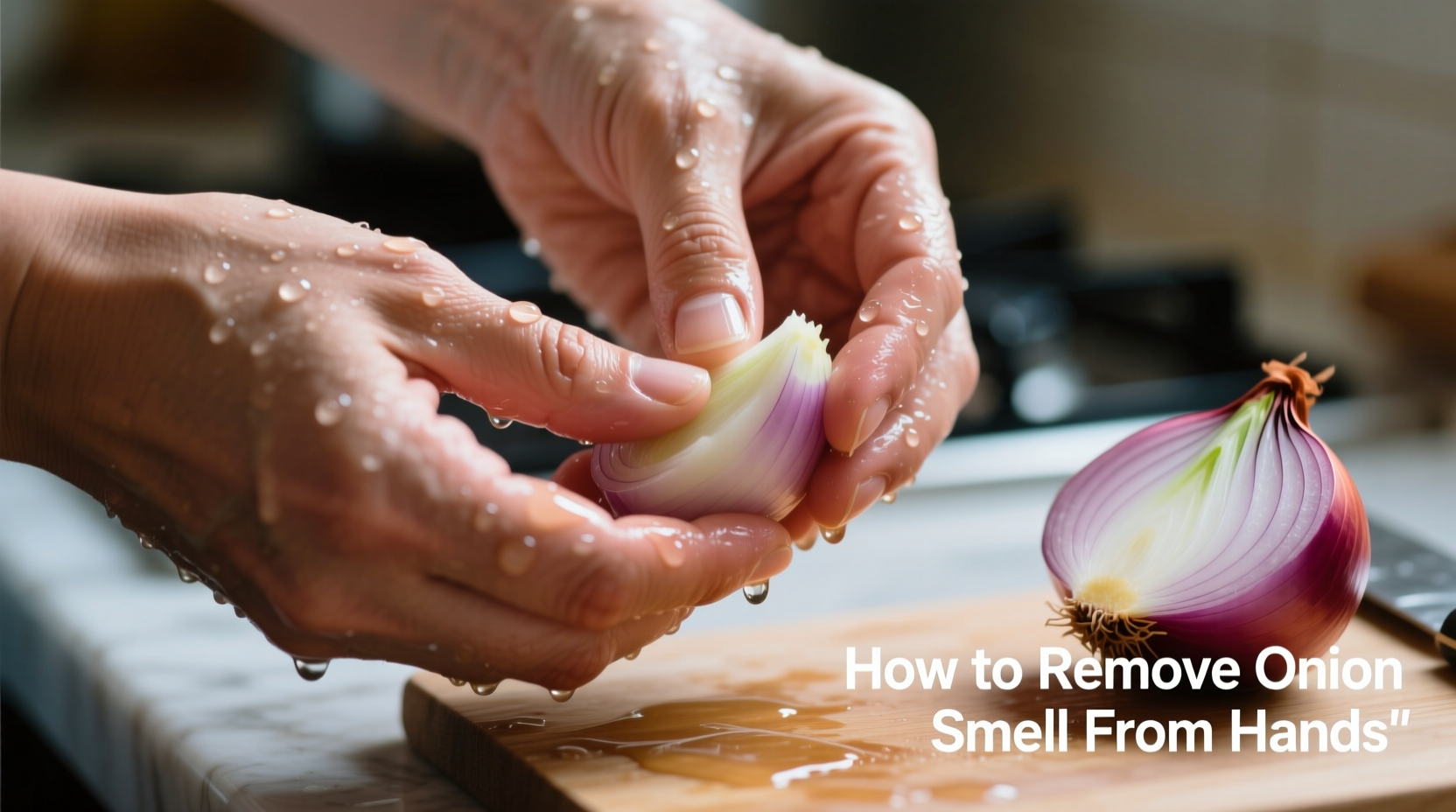Nothing ruins the joy of cooking quite like that stubborn onion smell clinging to your hands long after you've finished chopping. As a chef who's worked in professional kitchens for over 15 years, I've tested every method imaginable to solve this common culinary frustration. The good news? You don't need special products or complicated techniques. This guide reveals the most effective, science-backed solutions you can implement immediately with items already in your kitchen.
Why Onion Smell Sticks to Your Skin (The Science)
When you cut an onion, you rupture its cells, releasing enzymes that convert sulfoxides into sulfenic acids. These quickly rearrange into syn-propanethial-S-oxide - the volatile compound responsible for both tears and that persistent smell. According to research from the Institute of Food Technologists, these sulfur compounds bind strongly to the keratin proteins in your skin, which is why regular washing often fails to remove the odor completely.
| Method | Effectiveness | Time Required | Accessibility |
|---|---|---|---|
| Stainless steel + water | ★★★★★ | 30 seconds | High (common household item) |
| Vinegar solution | ★★★★☆ | 1-2 minutes | High |
| Lemon juice | ★★★☆☆ | 1 minute | Medium |
| Soap and water alone | ★☆☆☆☆ | 2 minutes | High |
Immediate Solutions: What Works Right Now
Stainless Steel Method (Most Effective)
Grab any stainless steel object - a spoon, knife, or dedicated soap bar - and rub your hands against it under cold running water for 30 seconds. The iron in the steel forms a stronger bond with the sulfur compounds than your skin does, effectively transferring the odor-causing molecules from your hands to the metal. This method works because of electrochemical attraction between the sulfur compounds and the steel surface, as documented in food chemistry studies by the American Chemical Society.

Vinegar and Water Solution
When steel isn't available, mix one part white vinegar with two parts water in a bowl. Soak your hands for 30-60 seconds before washing with soap. The acetic acid in vinegar breaks down the sulfur compounds through acid-base reactions. This approach works particularly well for those with sensitive skin who find lemon juice too harsh.
Alternative Methods Worth Trying
Lemon Juice Technique
Squeeze fresh lemon juice onto your hands and rub them together for 30 seconds before rinsing. The citric acid helps neutralize the alkaline sulfur compounds. While effective, this method can be drying for frequent use. For best results, follow with a moisturizer after the onion smell has been eliminated.
Baking Soda Paste
Create a paste with baking soda and water, then scrub your hands for 20-30 seconds. Baking soda's mild abrasiveness helps lift the compounds from your skin while its alkaline nature counteracts the acidic sulfur molecules. This method works moderately well but may leave a slight residue that requires thorough rinsing.
What Doesn't Work (And Why)
Despite popular belief, simply washing with soap and water alone rarely removes onion smell completely. The sulfur compounds have already bonded with your skin proteins, making them resistant to standard cleaning. Similarly, hand sanitizers containing alcohol don't address the chemical bonding issue and may even spread the compounds across your skin surface.
Prevention Tips for Future Cooking
Professional chefs minimize this problem through several techniques: wear thin food-safe gloves when handling large quantities of onions, use a sharp knife (dull blades crush more cells, releasing more compounds), and chill onions before cutting (cold temperatures slow the enzymatic reactions). For serious home cooks, investing in a stainless steel 'soap' bar specifically designed for odor removal provides instant solution without needing running water.
When to Seek Professional Help
While onion smell on hands is merely annoying for most people, persistent skin irritation after handling onions could indicate an allergic reaction. According to the American Academy of Dermatology, some individuals experience contact dermatitis from onion compounds. If you notice redness, swelling, or prolonged irritation, consult a dermatologist rather than continuing to try home remedies.











 浙公网安备
33010002000092号
浙公网安备
33010002000092号 浙B2-20120091-4
浙B2-20120091-4